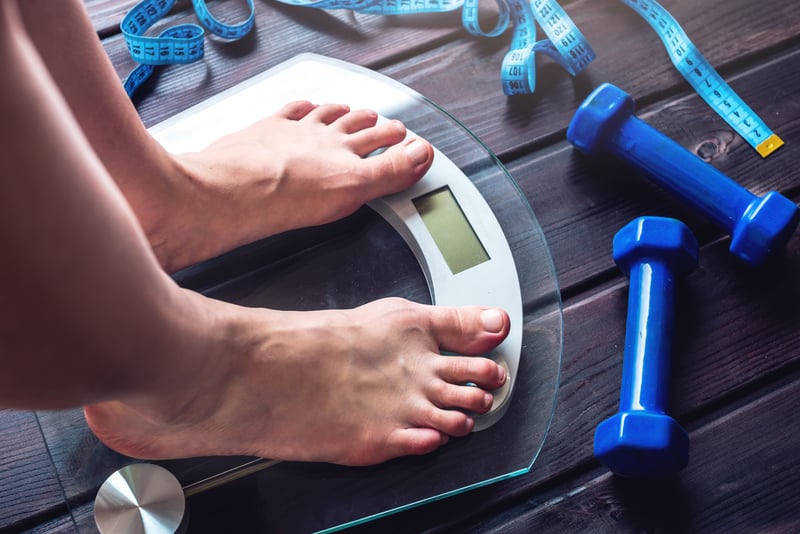Ask the Coaches: Why Do We Gain Weight as We Age?

– Gail
A: Thanks so much for your question today, Gail. This is one we get a lot, and I’m happy not only to share why we gain weight as we age, but more importantly, how to not just slow but even stop the weight gain.
It is true that weight gain occurs gradually as we age—often at a rate of about one pound per year.1 Interestingly, research suggests that’s around the amount of weight the average person gains during the holidays.2 And despite the staunchest resolutions, that weight often never makes its way off.
And even though we often assume we gain the most weight as we hit our 30s and 40s, believe it or not, the maximum rate of increased (unhealthy) body weight typically occurs between the ages of 18 – 25.3 You know, the ol’ “freshman 15.” That’s why it’s not surprising to hear people talk about “getting back to my high school weight.” Or to say “I haven’t been this weight since I was in high school.” Ah, the good ol’ days.
Having said that, research shows that folks tend to experience a 2 – 4% decrease in metabolic rate with each passing decade after the age of 20.4–6 For what it’s worth, this reduction in calorie-burning power seems be highest in obese men and lowest in normal-weight women. In other words, it’s never too early to start focusing on maintaining a healthy weight.7
But guess what? Even though a sluggish metabolism is often fatally labeled “age-related,” as you’ll see, it’s more appropriate to refer to it—and weight gain—as lifestyle-related.
8 Ways to Fight Off Weight Gain As You Age
1. Move it or Lose it
By and large, people tend to move less as they get older (making us gain weight as we age). In other words, physical inactivity and sedentary behaviors increase with age.8 We’ve talked before about how important being physically active is for overall health. But even more, moving less means burning fewer calories, which sways the pendulum in favor of weight gain. Along those lines, high levels of physical activity are a cornerstone of effective weight-management programs.9 Not surprisingly, increased levels of physical activity effectively help keep off the pounds while time spent watching TV (a common sedentary behavior) is associated with weight gain.1
What’s even worse is that reduced physical activity can be quite a vicious cycle. You see, as you choose to move less voluntarily, you’ll see a dramatic reduction in your functional fitness (strength, endurance, agility, flexibility) and physical capacity. This then results in difficulties in daily life activities and normal functioning.10 So, what was once a choice becomes inevitable. It doesn’t have to be that way. Get moving (while you can), and keep moving!
Naturally, this means getting plenty of aerobic exercise—either traditional cardio, interval training, or a combination of the two. But this also means moving more overall. As unhelpful as the advice to “sit less, move more” is, it’s a good reminder that even hitting the recommended targets for exercise aren’t enough to offset the potential harmful effects of sitting.
Increase overall physical activity levels by using a fitness tracker (7,000 – 10,000+ steps per day), setting alarms to get up and move hourly, and even standing (instead of sitting) to work, read, or do other tasks. New research shows that substituting sitting with standing for 6 hours a day can help burn, on average, an additional 50-plus calories.11 That may not seem like much, but that boost in calorie-burning power all but closes the gap on the typical age-related decline in metabolic rate (roughly 5 ½ calories/day/year)!
2. Lift Heavy (and light) Stuff
What’s also interesting to note is that adults lose 3 – 8% of their muscle mass per decade after the age of 30.12 And this only seems to get worse with age, as the rate of losing muscle strength ramps up to 12 – 14% per decade after 50.13 In fact, research shows that muscle mass and strength tend to decrease by a whopping 30 – 50% between the ages of 30 and 80.14 In a nutshell, if you don’t use it, you will lose it and gain weight as we age.
As you might recall, there’s a noteworthy decrease in metabolic rate with each passing decade as well. Along these lines, there appears to be a direct correlation between age-related decreases in metabolic rate and losses in muscle mass. This is not terribly surprising. After all, muscle is “metabolically active,” and it accounts for up to 50% of the total calories burned each day.15–17
But it’s not all bad news. Resistance training is an extremely effective tool to preserve muscle mass and strength as we get older. And even better news is that both heavy and lighter weights can get the job done. For most people, lifting weights 2 – 3 times a week and focusing on multi-joint movements that work the major muscle groups (e.g., squatting, lunging, pressing, pulling) is a good rule of thumb. An added bonus of strength training regularly: It can boost the metabolism (as much as 100 calories/day) for up to 72 hours after!18–20
3. Power Up with Protein
Remember in the movie Forrest Gump when Forrest says, “Me and Jenny goes together like peas and carrots.” Well, when it comes to preserving that all-important muscle mass and strength with age, if Forrest is like resistance training, then Jenny is like dietary protein. In other words, optimizing protein intake is crucial for maintaining calorie-burning muscle mass and preserving a healthy metabolism as you get older.
Believe it or not, as we get older, we may need even more protein due to something called “anabolic resistance,” which refers to the body’s reduced responsiveness to dietary protein. In fact, research shows that middle-age and older folks may need 0.55 – 0.73 grams of protein per day with regular meals containing about 30 grams of protein consumed several times throughout the day. Not just any protein will do, however, as you’ll need to emphasize high-quality protein sources (which contain all the essential amino acids).18,20
Optimizing protein intake is pretty tough for most people. And it can be even tougher as you get older, due to reductions in taste and appetite, slower gastric emptying, and changes in appetite-regulating hormones.21 Research shows that supplementing with a high-quality protein powder leads to greater gains in muscle mass and strength when combined with weight lifting.22 Here’s my top protein pick for healthy aging: Platinum 1 premium grass-fed whey protein.
4. Overall Diet Quality Matters
While optimizing protein intake is critical, overall diet quality is equally important when it comes to quality weight loss and weight management. For example, one study examining weight changes among over 120,000 men and women found that 4-year weight change was most strongly associated with the intake of French fries (3.35-lb weight gain), potato chips (1.69 lb), sugar-sweetened beverages (1.00 lb), processed meats (0.93 lb), sweets and desserts (0.41 lb), and refined grains (0.39 lb per serving per day). On the other hand, weight change was inversely associated with the intake of vegetables (−0.22 lb), whole grains (−0.37 lb), fruits (−0.49 lb), nuts (−0.57 lb), and yogurt (−0.82 lb).1
In other words, emphasizing a diet rich in whole, minimally processed foods was more likely to prevent weight gain. Not surprisingly, consuming more processed foods seemed to strongly contribute to packing on the pounds. Even more, a higher-protein dietary pattern that focuses on nutrient-rich, low-energy-dense healthful food choices without energy restriction (which can further contribute to a reduced metabolic rate) can promote a little something I like to call quality weight loss. This simply means losing fat while maintaining (if not building) calorie-burning lean muscle.
While there are many effective diets out there, consider a Mediterranean or hunter-gatherer (i.e., Paleo) lifestyle. Although distinct, these ways of eating are the antithesis of the typical Western-style diet. They emphasize eating REAL food, including a high amount of plant-based foods. They also consistently rank highly for diet quality and health outcomes.23
5. The Scale IS Your Friend
Believe it or not, research shows that frequent self-weighing is quite an effective tool for weight maintenance.24,25 Generally speaking, folks who weigh themselves weekly—perhaps better yet, daily—have better weight-loss outcomes and are more successful at preventing weight gain as we age. In fact, daily self-weighing seems to be quite an effective tool for preventing age-related weight gain specifically.
Keep in mind that this is an accountability tool that provides information (about how your current behaviors are impacting your weight). While some suggest that frequent self-weighing may be associated with negative mental and emotional consequences, this doesn’t seem to be the case for most people.25
Consider keeping track of your daily weigh-ins in a spreadsheet. Rather than viewing them individually, look at changes over time and consider using visual feedback like a chart, which seems to be an even more potent weight-management tool.
6. Get Just Enough Beauty Rest
It shouldn’t come as much of a surprise that not getting enough sleep (<6 hours per night) can definitely increase the likelihood to gain weight as we age. There may be a couple reasons for this. For starters, the more hours you’re awake, the more likely you are to eat. Also, people who sleep less tend to stay up later. And generally speaking, night-time is usually when people tend to make poor food choices. Plus, not getting enough sleep tends to increase hunger and cravings while enhancing palatability for junk food.
What may surprise you, however, is that getting more than 8 hours of sleep a night is also associated with weight gain.1 In other words, there seems to be a “sweet spot” when it comes to sleep of between 7 – 8 hours. This emphasizes the importance of healthy circadian rhythms, sleep hygiene, and even the application of time-restricted feeding (limiting the amount of time you eat to 8 – 12 hours daily), which may improve sleep and prevent weight gain.26
7. It’s (NOT) All about the Hormones
No discussion on age-related anything would be complete without mentioning hormones. There’s no question that levels of hormones change with age. Reproductive and growth hormones plummet (menopause, andropause, and somatopause are a few terms that come to mind). Meanwhile, multiple studies have shown that the stress hormone cortisol seems to creep up while insulin sensitivity tends to decline with age.
That cascade of hormonal changes undoubtedly increases the likelihood to gain weight as we age. However, despite popular belief, age-related changes in hormones do not appear to cause weight gain. Rather, weight gain per se seems to be traced back to the lifestyle factors (e.g., reduced physical activity) mentioned above.
Having said that, these hormonal changes do seem to favor increased body fat, and more specifically, abdominal fat storage, which is bad news. And there’s no doubt that lower testosterone and growth hormone levels make building muscle pretty dang hard.27
While I’m neither an endocrinologist nor do I play one here on the blog, it may be worth having a conversation with your healthcare provider about balancing your hormones. There’s evidence that hormone therapy may prevent the typical accumulation of abdominal fat associated with these hormonal changes. Keep in mind, Gail, that lifting weights, eating a healthy diet, and maintaining healthy circadian rhythms (discussed above) can go a long way to help maintain muscle mass, keep belly fat at bay, and support a healthy hormonal milieu.
8. Support is Key to Success
While all these tools, tactics, and strategies can be effective, they can be tremendously difficult to implement and maintain on your own, which becomes increasingly common as we age. And it can be even harder when you’re surrounded by negativity, which can undermine your efforts. This is why positive social support is tremendously important when it comes to eating healthy, exercising regularly, and maintaining a healthy weight.28
Being a part of a community that supports, encourages, inspires, and motivates you while also providing accountability can be THE most important factor in your long-term success. We know this, and that’s why we’ve created our own private VIP Community that we’d love for you to join.
Why We Gain Weight As We Age? A Recap!
Gail, I hope this not only answered your question but provided the information you need to put a stop to the “inevitable” occurrence of weight gain with age.







